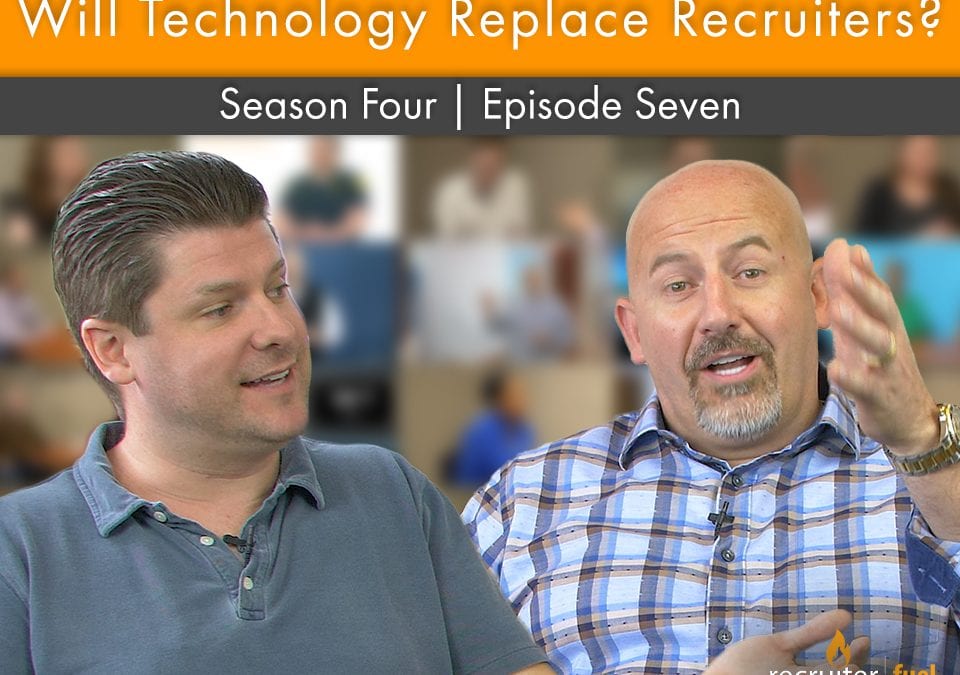
Season 4, Episode 7:
Will Technology Replace Recruiters?
This week on Recruiter Fuel,Steve sits down with Recruiter, Andrew Porte (who you might remember from episode one of this season), to discuss a terrifying subject.
Technology is going to replace you.
Andrew doesn’t necessarily believe this, “When you think of recruiting, people automatically think; get their resume, get their profile, contact the person and hire them. There’s a lot more that goes into the ‘stew or the recipe’, I just don’t even understand how AI or a job board can do that.”
Over the years, there have been a lot of technology advances that have left recruiters questioning if they would have a job the next day. First, it was an ATS, then it was job boards, and then it was LinkedIn. Yet, Steve and Andrew are still here today to talk about this nerve-wracking topic. “I think those tools are good, they’re definitely helpful for people like myself, I just think when you really get into the recruiting process, there is so much more to it. I would be surprised if somebody came out with something that could do it from end to end,” said Andrew.
How does LinkedIn play into the whole technology and recruiting game from your perspective?
Andrew noticed that with a lot of clients, they start looking at LinkedIn on their own and then realize they need a professional recruiter to get the job done. So yes, it makes our life easy, and yes, everybody has access to technology platforms such as LinkedIn – but that doesn’t necessarily mean everybody knows how to use it properly.
I wish technology would see this conversation…
Steve asked Andrew to elaborate on a very complex scenario technology would be unable to handle on it’s own. Andrew explained that he was working with a client on filling three different levels; a director, a manager, and an assistant. Andrew had a discussion with his client on the candidates he found i.e. what they’re getting paid, why they might be interested, and why they might not be interested. When the conversation turned to compensation, they needed to determine whether they needed to stay on course, up the compensation, or go a level down and look for someone more vulnerable. Andrew said, “Again, can technology do some of the sourcing? Yes, but as far as getting into the data, presenting it to a client, giving a market outlook and trying to give the client a few options to move forward… I think that’s where recruiters and people are very valuable and irreplaceable.”
You can program the algorithm to go out and find these keywords, but who develops these keywords? Who tells the machine what to go after?
“For the intake call, the start of the recruiting process, I have a 6-page questionnaire I go through with people. There’s a difference in what’s in the job description versus what they really want. If you just feed a job description into a system, you might get individuals that resemble the job description, but as we all know, a job description doesn’t always get you where you need to be,” Andrew responded.
What do you have to say to those who still think technology is going to replace you in three years?
“Maybe for some of the easier roles”, Andrew said. “When it comes to the executive roles, hybrid roles, or the roles where you need a lot of competency screening, diversity, or what people are making.” Andrew is confident he’s still going to have a job in the next few years.
Not only is technology changing the recruiting industry, but the skillset to use the technology in recruiting is changing. “You’ve got to know more to be a recruiter today than even a few years ago,” said Steve. He continued, “If you’re going to get rid of recruiting, you might as well get rid of sales and automate everything. We all know you can’t replace some of those relationships.”
Andrew added, “You can get a candidate interested by getting a message out to them, but everybody involved with the hiring process knows there is a lot that goes into it once the candidate gets the offer.” Andrew and Steve both agreed they could never imagine a machine figuring out how to turn someone from a not interested candidate, into an interested candidate.
To create a machine that can have a two-way conversation and pick up on emotions/cues that recruiters do so well AND give that program every potentially viable option to respond with – Steve just doesn’t see that happening anytime soon. Andrew said that a lot of recruiting involves thinking on your feet, “You really have to react to the person you’re getting – their attitude, how they answer the phone, and what they’re looking for.”
For now, Andrew feels pretty secure in his job.
Steve is a huge advocate of technology and feels it’s an integral piece of recruiting, but he does not believe that technology will be replacing recruiting – at least in his lifetime.
About Recruiter Fuel
Recruiter Fuel is a weekly video series dedicated to all-things recruiting and talent acquisition. Learn More our mission and how you can submit a topic, be featured in an episode, or nominate an expert to guest star on an upcoming episode.
Visit the Recruiter Fuel series directory for more content.





